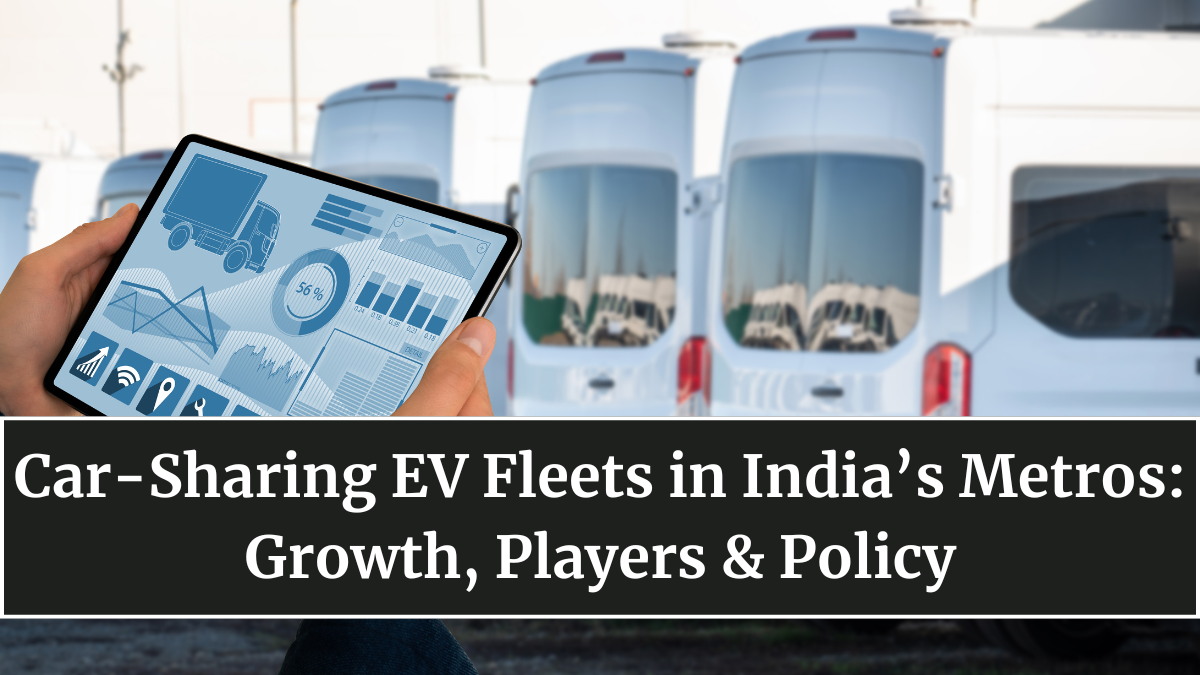The way India moves is changing — and it’s going electric, shared, and smart. The India car-sharing EV fleets in big cities revolution is redefining how people commute in 2025. From tech professionals in Bengaluru to travelers in Delhi and families in Mumbai, more Indians are turning to shared electric cars as a practical, affordable, and eco-friendly way to move around. This shift represents not just a transportation change but a transformation in how Indian cities think about space, environment, and convenience.

The Rise of Shared Electric Mobility
Car-sharing is not new to India, but the move toward electric car-sharing fleets has given it a fresh identity. Post-pandemic urban mobility trends show that people want flexibility without the burden of ownership. Rising fuel prices and stricter emission norms have further accelerated the adoption of EVs in shared platforms.
Cities like Bengaluru, Delhi, Pune, Hyderabad, and Chennai are leading this revolution. Companies such as BluSmart, Zoomcar, Revv, and Quick Ride are investing heavily in EV fleets for daily commuters, corporate employees, and airport rides. For many urban users, this offers the perfect combination of sustainability and convenience — no fuel hassle, no maintenance worries, and zero emissions.
Key Players and Their Growing EV Fleets
India’s car-sharing market is evolving with both domestic startups and established brands expanding their EV footprint.
| Company | Fleet Size (Approx.) | Coverage Cities | Notable Features |
|---|---|---|---|
| BluSmart | 7,000+ EVs | Delhi NCR, Bengaluru | 100% electric fleet, app-based rides |
| Zoomcar | 3,500+ vehicles | 25+ cities | Subscription model, self-drive EVs |
| Revv | 1,200+ EVs | 15+ cities | Rental and corporate fleet options |
| Lithion Mobility & ETO Motors | 2,000+ | Hyderabad, Pune | Fleet leasing and ride-sharing EVs |
| Ola Electric (Pilot Program) | 500+ | Bengaluru | App-linked sharing for short trips |
These players are also supported by fleet financing initiatives and government incentives that make EV procurement easier for mobility operators.
Government Push and Policy Support
The Indian government’s FAME-II scheme and state-level EV policies have played a vital role in accelerating fleet electrification. Many states offer reduced registration fees, road tax exemptions, and parking incentives for shared EV operators.
Urban local bodies are collaborating with startups to install charging stations in public parking zones and metro stations, ensuring convenience for fleet operations. Bengaluru and Delhi have even set EV fleet mandates, requiring a percentage of all rideshare vehicles to be electric by 2026.
Additionally, battery swapping stations and smart charging hubs are being introduced to minimize downtime for ride-hailing services, making operations more cost-efficient.
Why Car-Sharing EV Fleets Are Winning
Several factors explain the growing success of EV-based car-sharing in Indian metros:
-
Affordability: Per-kilometer cost of EVs is far lower than petrol or diesel cars.
-
Convenience: App-based access and short-term rentals suit urban lifestyles.
-
Sustainability: Zero tailpipe emissions contribute to cleaner city air.
-
Corporate adoption: Many companies now provide shared EVs for employee transport.
-
Government incentives: Lower taxes and policy support improve long-term profitability.
As Indian cities become more congested, shared EV fleets also help reduce the total number of vehicles on the road, improving air quality and easing traffic.
Challenges and the Roadblocks
Despite strong growth, the car-sharing EV industry faces challenges. High upfront cost of EVs, limited charging infrastructure, and battery replacement expenses still affect profitability. Maintenance and fleet management also require specialized skills and technology.
Another issue is consumer mindset — many still prefer personal vehicles over shared ones, despite the rising cost of ownership. Educating users about the reliability, hygiene, and safety of shared EVs remains essential for mass adoption.
The Road Ahead for Shared Electric Mobility
The future of shared EV fleets in India’s metros looks promising. With major investments from both public and private sectors, the next wave will focus on autonomous fleet integration, AI-based routing, and predictive maintenance to improve uptime and reduce costs.
By 2030, experts predict that up to 40% of India’s urban shared rides could be electric. The combination of technology, policy, and consumer demand is making shared EVs a central pillar of India’s smart mobility vision — one that’s cleaner, quieter, and built for the cities of the future.
FAQs
Which cities in India have EV-based car-sharing fleets?
Major metros like Delhi, Bengaluru, Hyderabad, Pune, and Chennai have active EV car-sharing services.
Which companies lead the shared EV market in India?
BluSmart, Zoomcar, Revv, and Ola Electric are among the top operators expanding their EV fleets rapidly.
How do car-sharing EV services work?
Users can book EVs via mobile apps for short-term use or subscriptions, paying only for duration or kilometers used.
Are there government incentives for shared EV fleets?
Yes. Under FAME-II and state EV policies, operators get benefits like tax waivers, parking concessions, and financing support.
What is the future of car-sharing EVs in India?
With growing urbanization and eco-conscious consumers, EV-based shared fleets will dominate urban transport by the end of the decade.
Click here to know more.
